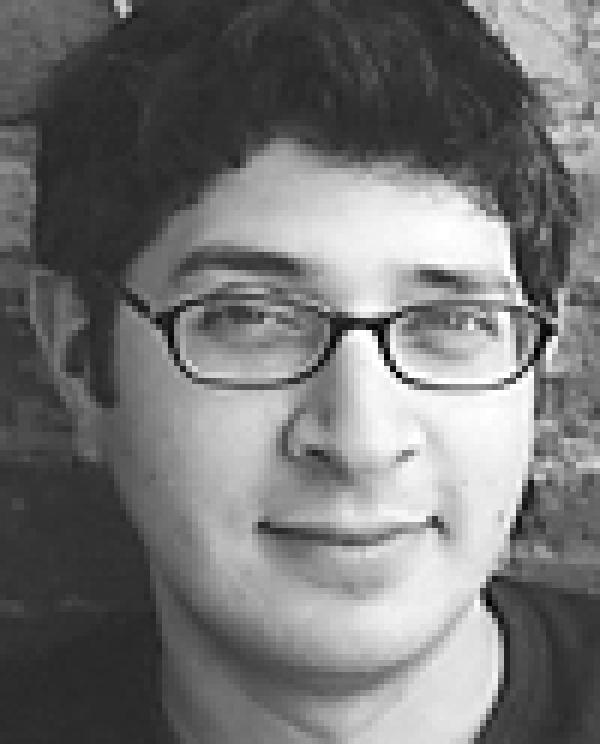Michael Mejia

Bio
Michael Mejia's novel Forgetfulness was published by FC2 in 2005. He received a grant from the Ludwig Vogelstein Foundation in 2003, and his fiction, nonfiction, and reviews have appeared in or are forthcoming from Agni, Denver Quarterly, Quarterly West, 3rd bed, New Orleans Review, Salt Hill, Tatlin's Tower, Pleiades, and American Book Review. A native of Sacramento, California, he currently lives with his wife in Rome, Georgia, where he teaches creative writing at Berry College.
Photo by Mindy Wilson
Author's Statement
I was slumped, sullen, stubborn, starving. End of the semester and I needed a lift. And then the phone rings. An off-campus call. It's Campbell Irving and he sounds like a student who will want me to sign him into my full creative writing class next semester. But then, no. He repeats: Campbell Irving. He says: National Endowment of the Arts. Nice guy this Campbell Irving. I say: Thank you. I say: Thank you thank you. I ask: How's the weather up there in D.C.? Honestly, I had very modest hopes for my first novel, Forgetfulness, a meditation on the life and work of Austrian twelve-tone composer Anton Webern, published by NEA-funded FC2 in 2005. Which is to say, I had modest hopes for the year 2005. I get reviewed, I give some readings, I meet some people, I begin to develop a public identity as a writer. This is what I think. And then some. Thanks to the NEA, I might now think of the year 2005 in terms of attaining a terrifyingly wide new vista, a serene and silent space in which to research and write, from which I have already set off on the solitary and vertiginous rise toward a second novel. Perhaps this vision reflects the continuing influence of Webern, a committed alpinist and one whose art, in fact, flourished most in the exile of isolation, in the awardless silence imposed by the Nazi state. Every turn of my last year's trail, from December to December (and there have been so many more turns than I had imagined possible) has broadened my sense of what one book, one long tale from a fictional Tokyo, one grant application, might accomplish. Which is to say that every turn has expanded the horizon, improved my visibility, improved my vision, this last being precisely what I believe fiction, and all art, must do. This is what the NEA has done for me, what their recognition and investment will continue to do for me for years to come. Are my feet still on the ground? Decembers, they are special. Webern was born. My wife and I were born, and we were married. I received a call from Campbell Irving of the NEA. Thank you.From the novella "Report of Ito Sadohara"
Saburo and I entered the Tokyo Central Wholesale Market at approximately seven forty-five on the morning of 21st April. Tsukiji was hurtling towards the final half of its day. Bicyclists and ta-rays careened through the crowd, the men and the machines all seeming to balance equally great numbers of boxes, crates, and cages. Cranes groaned outside on the docks, loading and unloading hauls of flash-frozen fish from every sea, lake, river, pond, bay, and ocean around the world - redfish and Atlantic cod, albacore, fugu, king and queen mackerel, flounder, swordfish, shark and salmon, herring, roughy, walleye pollock. Tuna.
Lights flashed and sirens wailed. Engines and hydraulic systems hummed, creaked, and whined through their business, their sounds so harmonious with the human pandemonium that it seemed every object, every person, the little breeze blowing ripples through the market's bright banners was somehow driven by the operations of a vast and covert system of flywheels, pistons, and spinning shafts.
The grandeur of this spectacle made me forget Sato for the moment, as well as the bother of having to leave my office. Tsukiji swirled around me, spread itself open before me, a voluptuous garden, solicitous, overripe with fish, meat, and produce, with the scent of two thousand flowers, with humanity, buyers and sellers, the seemingly innumerable rows of stalls and tables and stands and workers stretching away into the distance, in every direction, a great organic machine, oblivious to the existence of a larger world outside, circumscribing it, regulating its systems.
There is no air in Tsukiji, Minister, only water, and one must learn to breathe it to survive: salty bay fog and the fresh spray of hoses, mist rising from the defrosting fish, steam from a teakettle. My socks grew damp as the wet sheen of the cement found its way up through the unprotected seams of my soles. A pair of spirited women sifted through bins of beans and mushrooms, while, nearby, a man shook his head and washed shrimp. And there were younger ones, laughing as they chopped the heads off salmon, joking about the previous night's Swallows-BayStars baseball game. There were buckets of clams and oysters, quivering sardines, tanks of lobsters. From every restaurant came the smell of tempura and yosenabe, botanwan and kabayaki.
Young boys and women handrolled sushi for floor managers reading the newspaper on their break. They were all new men, these managers, a generation or more younger than myself, and I knew I would never know them. There was a time when, at every step through Tsukiji I would have encountered a friend or an acquaintance. That was only a short time ago. The comings and goings of people in my business, as well as yours, Minister, are infinitely more swift and unambiguous than the fluctuations of the Catch.

